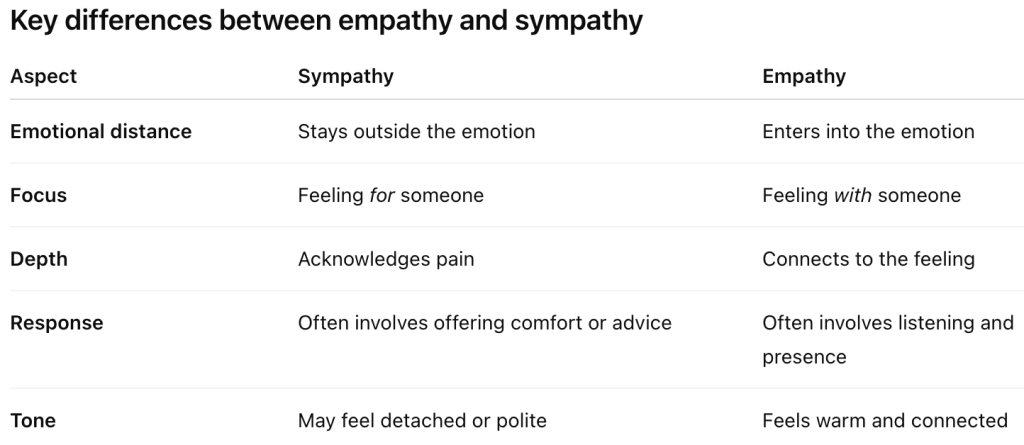Although the words empathy and sympathy are often used interchangeably, they describe two very different ways of responding to another person’s emotional experience. Both involve recognizing someone’s suffering or struggle, but the depth of connection and emotional involvement is what sets them apart.
At their core, sympathy is about acknowledging someone else’s pain, while empathy is about feeling it with them. Sympathy stays on the surface; empathy goes deeper. Understanding the difference is not only helpful in personal relationships but also plays a big role in communication, therapy, leadership, parenting, and everyday support.
What is sympathy?
Sympathy means you recognize that someone is going through a hard time, and you might feel sorry for them. It is a response that comes from compassion, but it keeps a certain distance. You might offer kind words, encouragement, or support, but you do so from the outside looking in. For example:
- “I’m so sorry you’re going through that.”
- “That must be really hard.”
- “Let me know if there’s anything I can do.”
These statements show care and concern, but they don’t involve trying to feel what the other person is feeling. Sympathy often feels safer because it doesn’t require you to deeply engage with another person’s pain. However, it can also feel impersonal or dismissive if not expressed with genuine warmth.
Read more about sympathy here
What is empathy?
Empathy, on the other hand, is the ability to understand and share the feelings of another person. It means putting yourself in their shoes and imagining what they’re going through emotionally. Instead of saying, “I feel sorry for you,” empathy says, “I feel with you.” Empathy involves:
- Listening without judgment
- Being emotionally present
- Validating the other person’s feelings
- Offering comfort through connection, not solutions
For example, if someone says they’re feeling lost after a breakup, an empathetic response might be: “I know how painful that kind of loss can feel. You don’t have to go through it alone.”
Read more about empathy here

Empathy builds trust and closeness. It shows the other person they’re not alone in their experience. Sympathy can sometimes unintentionally create a power imbalance—“you’re the one suffering, and I’m on the outside observing it.” Empathy, however, levels the ground—it says, “I’ve been there too” or “I want to understand what you’re going through.”
Why the difference matters
Recognizing the difference between empathy and sympathy helps improve communication and relationships. While sympathy has its place—especially in formal or distant settings—empathy is what fosters deep human connection. It is what helps people feel seen, understood, and less alone.
In therapy, parenting, friendships, or leadership, empathy builds trust. When people feel that you’re truly listening and connecting with their emotions, they’re more likely to open up and heal.
On the other hand, sympathy—when overused—can sometimes feel dismissive or hollow. For example, saying “I’m sorry you feel that way” without trying to understand the experience may shut someone down instead of comforting them.
Can you show both?
Yes. Often, empathy and sympathy work best when balanced. You might first express sympathy to show you care, then move into an empathetic response to connect more deeply. For instance:
“I’m so sorry you’re dealing with that. It sounds like you’ve been carrying a lot lately. That must be really hard.” Combining the two shows both kindness and emotional presence.
Conclusion
Empathy and sympathy both begin with a caring heart—but empathy takes the extra step. It moves beyond recognizing someone’s pain and into shared emotional experience. Whether you’re comforting a friend, supporting a colleague, or helping a loved one through grief, understanding this difference can make your response more meaningful. In a world that often encourages speed and distance, empathy slows us down and draws us closer, reminding us that being present for someone is sometimes the most powerful help we can offer.
